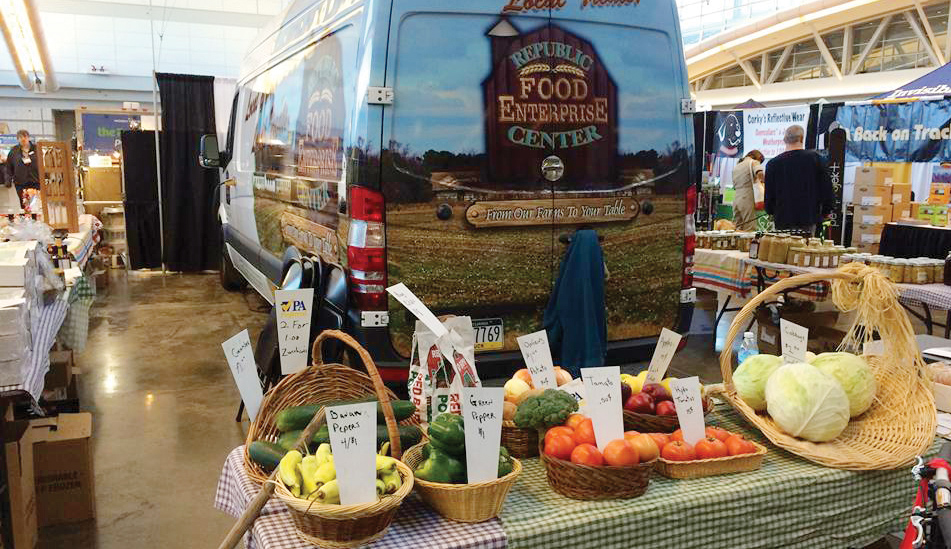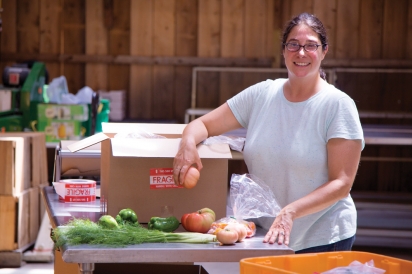First Course: Bringing Farm Fresh Food to Our Communities
By Sierra Smith | Edited by Andrea Bosco Stehle
As many Western Pennsylvanians know, plenty of communities in our region lack reliable access to fresh, locally grown produce. But as of 2010, the Republic Food Enterprise Center (RFEC), a “food hub” based in Fayette County, has been filling the gaps between its farms and the surrounding communities’ tables in a variety of ways. According to Bob Junk, director of sales and marketing, the RFEC is a “full-service, one-stop shop. We can do basically anything with food — be it processing, packaging, servicing. Anything the customer wants.” And most recently, the RFEC has been branching its operations out beyond Fayette County, to service underfed communities in Westmoreland, Washington, and now, our very own Allegheny County.
To meet the nutritional needs of Western Pennsylvania, the RFEC uses a “comprehensive approach,” operating several successful programs such as a shared-use kitchen for aspiring food entrepreneurs and farmers, a catering company that exclusively uses locally sourced food, and much more. Although each program is just a small piece of the bigger RFEC picture, they have one common goal: to continue the development of sustainable and local food products for the surrounding counties, to benefit small farms, and to eradicate food deserts in Western Pennsylvania.
Of the RFEC’s various programs, the shared-use kitchen is the largest and most versatile, operating out of an old IGA warehouse in Republic, Pa., to service both farmers and food entrepreneurs alike. According to Mark Swankler, general manager of the RFEC, there are currently seven entrepreneurs in the kitchen, producing goods like Ideal Granola, Mr. G’z Slatherrring Sauce, Bobsamic Salad Dressing, and more. Farmers can also use the facilities to jar their excess produce, adding value and shelf-life to their crops while decreasing unnecessary food waste. According to Swankler, the RFEC can provide services for anyone — “for farmers, food entrepreneurs, anyone looking to break into the food industry.”
The company also provides catering services, with healthy and delicious menu options that “emphasize the local flavors” of Western Pennsylvania. “We try to use nothing but local products when we can in our catering,” says Swankler, but that can affect the seasonal availability of certain products. However, in conjunction with local school districts, the RFEC is working to produce Individually Quick Frozen Vegetables to continue offering fresh veggies after their season has ended. “We want to branch into the schools,” says Swankler, “and provide them with fresh vegetables from local farms.”
Just in time for the holidays, the RFEC will be opening a small retail outlet at its facility, one of three that are planned to open in the coming year. The outlets will exclusively sell products made and grown locally, within a 300-mile radius of the RFEC’s headquarters, to eliminate the Fayette County food desert and provide upwards of 40 new full-time positions for underserved residents. Throughout the rest of the holiday season, you can find the RFEC’s food truck at local pop-up and farmers markets, where they’ll be selling seasonal jarred products, or purchase a customizable gift box that could include anything from locally made jams and jellies to RFEC’s savory rubs. On December 3, check out the RFEC’s catering prowess out at Fayette County’s annual Magic and Mistletoe event, located in the historic Fayette County Courthouse. And after the New Year, you can find the RFEC at the 2017 Pennsylvania Farm Show in Harrisburg.
From marketing and distribution, to providing commercial-grade food-processing facilities, the RFEC goes above and beyond to meet the needs of not only Fayette County, but the surrounding region as well. By covering so much ground with its myriad programs, the RFEC can continue to link its farms to our tables, by getting fresh, local products into the underserved parts of our communities, providing necessary services to jumpstart food production, and working with farmers to add value to their crops. “Me and Mark,” says Junk, “we can do anything. We can go from the dirt to the kitchen table.”
Republic Food Enterprise Center, republicfoodenterprisecenter.org.
Eats From the Earth
About a two-hour drive north of Pittsburgh, Edible Earth Farm in Tionesta prides itself on being one of the largest farm-direct, community-supported agriculture programs in the area. Founded in 2010 by April Parker, and later joined by her husband, Johnny, the farm grows a wide variety of produce and raises livestock. Going into its eighth season, the farm is looking to acquire more land in order to continue to serve the local community with certified organic goods. As with any community-supported initiatives, the farm is seeking donations to make this endeavor happen. “All of the money donated will go toward a down payment on a new farm, which can exceed costs of $70,000,” Johnny says. In just a few days of rolling out the campaign, the farm has raised almost $2,000 of its $10,000 goal — mostly through word of mouth. “I would implore folks to consider this an investment in the local food system,” continues Johnny. “It’s a vote of confidence in the ability of young producers to supply the region with organic food.” Future points of expansion include selling in local, regional grocery stores and constructing a food processing facility on the farm. “We love growing for our customers and for the many folks in this region,” Johnny says. “Ultimately, we are very thankful for the opportunity to continue to do what we love.”
To make a donation to Edible Earth Farm, visit razoo.com/us/story/edibleearthfarm or edibleearthfarm.com. Edible Earth Farm, 22430 US-62, Tionesta. 814.303.9663. — Matthew Hacke
Brimming with Potential
Since 2015, 412 Food Rescue — the only organization in Allegheny County exclusively focused on finding uses for discarded food — has made a beneficial impact on the environment and combatting hunger. This fall, the organization has partnered with East End Brewing and Wigle Whiskey, respectively, on the limited release of two specialty, alcoholic concoctions: LOAF beer and FORAGE Pommeau. In following 412 Rescue’s mission to end food waste, the two drinks combine food products that would otherwise be thrown away.
LOAF beer, a product of East End Brewing, is made with stale bread from Five Points Bakeshop. “Bread is one of the surplus items we collect the most,” says Leah Lizarondo, CEO of 412 Food Rescue. “This stale bread would have gone to landfills, so we think this is a delicious way to resurrect it.” LOAF beer will be available to purchase through December 9 in full shares (four growlers) or half shares (two growlers).
FORAGE Pommeau, produced by Wigle Whiskey, gets its name and flavor from the wild apples in Pittsburgh that are “foraged” so that they don’t go unharvested. 412 Food Rescue rounded up volunteers this past September and October to gather apples around the city for this purpose — amassing over 2,500 pounds of the fruit! On December 9, the Strip District locale will host a public release party where guests can sample the libation and purchase one of the 200 bottles produced to take home afterwards, while supplies last.
412 Food Rescue, 412foodrescue.org. East End Brewing, 147 Julius St., East End. 412.537.2337. eastendbrewing.com. Wigle Whiskey, 2401 Smallman St., Strip District. 412.224.2827. wiglewhiskey.com. — M.H.
+ Purchase LOAF Beer at East End Brewing’s shop and FORAGE Pommeau at Wigle Whiskey’s Strip District location. Both beverages are also available at 412foodrescue.org.






